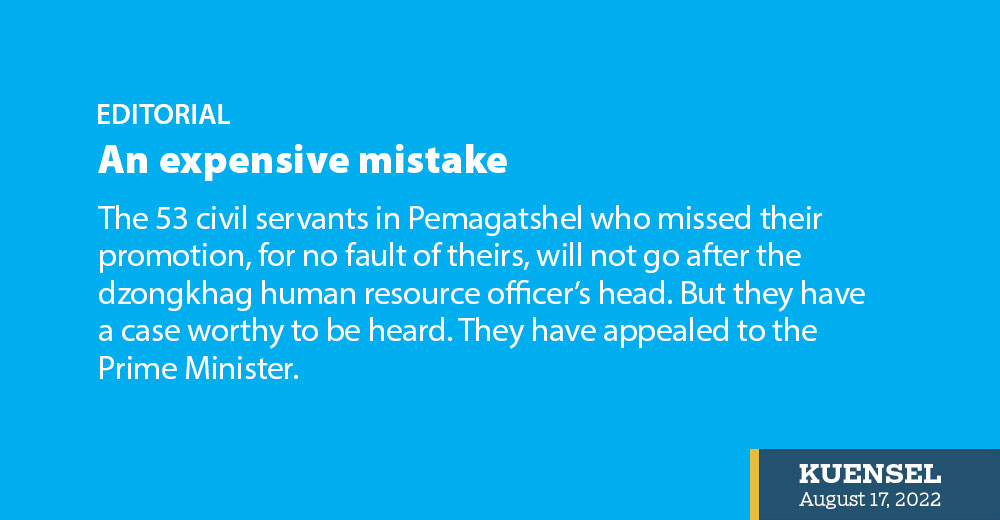The 53 civil servants in Pemagatshel who missed their promotion, for no fault of theirs, will not go after the dzongkhag human resource officer’s head. But they have a case worthy to be heard. They have appealed to the Prime Minister.
The PMO is in talks with the civil service commission. What will be decided is not certain. What is certain is that the inaction of the officer has cost the 53 civil servants, some of whom are nearing superannuation, dearly.
As they wait for a response, they are calculating the repercussions. The financial benefits are not much, some estimate a range between Nu 1,000 and 2,500 on the basic salary. But given that promotions come only once in four years, the amount, however small, will make a significant difference. The financial benefits that come once in four years are not enough to keep up with the run-away inflation rate. There are bigger implications.
A senior civil servant in the group, if not promoted, could lose two year’s source of income. If promoted timely, he could jump to the next level where the retirement age is 58. He would have secured two more years of income, notwithstanding his contributions. For the salaried group, the yearly increment, even if hardly enough to cover inflation or the promotion, means a lot. When it is delayed or revoked, especially for reasons as absurd as not being able to update on time, it is discouraging.
There will be a solution, we hope. A few hundred ngultrums’ raise on the basic salary means improved saving because of an increase in the various allowances calculated on the basic salary.
The Pemagatshel incident may be an isolated case. However, in the context of the transformation exercises happening in the civil service, it is a good lesson. It is about taking people to task for not shouldering their responsibilities.
The officer responsible admitted to his mistake.
But the reasons for the delay are astounding. He was kept busy coordinating moenlam chenmo in the dzongkhag besides training he had to attend. If we are to talk about accountability, it should not stop with him.
We know that civil servants in the dzongkhags have to multitask.
Unfortunately, most of the time it is for unfruitful activities. A dzongkhag agriculture officer or engineer should be in the fields helping farmers or the government to improve services. He should not be busy with chadri (preparation). Civil servants in Paro complain that they are busy receiving or seeing off guests at the airport when they have more pressing issues to handle.
If we want to talk about service delivery, a lot has to change.


